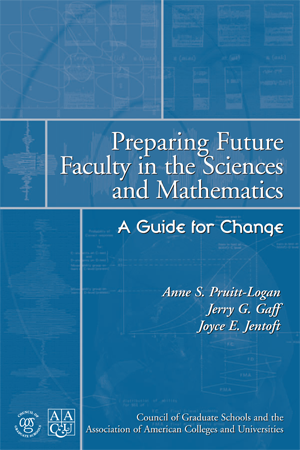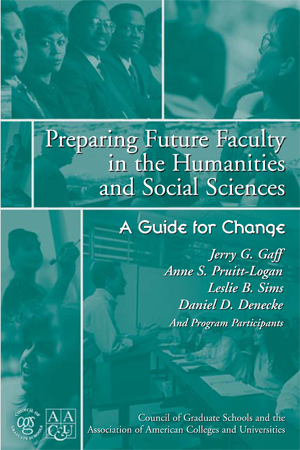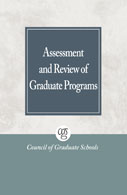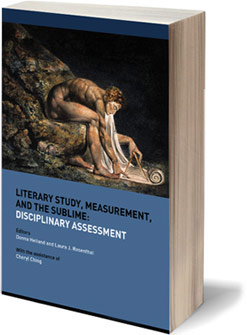You are on CGS' Legacy Site.
Thank you for visiting CGS! You are currently using CGS' legacy site, which is no longer supported. For up-to-date information, including publications purchasing and meeting information, please visit cgsnet.org.
General Content
On April 19, 2012, CGS and Educational Testing Service (ETS) released a report Pathways Through Graduate School and Into Careers that calls on university, business, and government sectors to team more closely — and innovatively — than they do now in order to prepare the highly skilled talent the country needs to be successful going forward.
The report examines career pathways from the perspective of students, graduate deans, and employers. The analysis of the quantitative and qualitative data led to a set of recommendations for university leaders, employers, and policymakers, along with the call for greater collaboration among these three sectors.
Produced by a 14-member commission of university and business leaders convened by CGS and ETS, the report and associated materials are available at http://pathwaysreport.org. We hope you will share the report widely and join us in working to strengthen the pathways for graduate students into the full spectrum of 21st century careers.
For more information, please contact:
Funded by the Office of Research Integrity (ORI), the CGS Project for Scholarly Integrity (PSI) supports the development of institutional models for embedding enhanced research integrity and responsible conduct of research education into graduate education. The project awardees will be featured at ORI’s 2012 Quest for Research Excellence Conference in Washington, DC. from March 15-16, 2012.
For more information about the Project for Scholarly Integrity, please visit the PSI website or the project page on the CGS website.
The CGS Career Portal is a current listing of open positions for graduate deans, associate/assistant deans, administrative staff, faculty, and other higher education professionals.
For questions about the CGS Career Portal, please contact Boxwood Tech.
Jobs Seekers in the graduate education community will benefit from free resume postings with a confidential posting option, filtered search options, and the ability to receive updates on jobs that fit desired search criteria.
Employers will benefit from cost-effective advertising packages, discounted pricing (CGS members only), and the ability to receive email alerts when new resumes matching your specified criteria are posted. Please use the links below to begin using the service as an employer or a job seeker!
|
CGS Career PortalSearch and create employment opportunities
|
|||
|
Job Seekers
|
Employers
|
||
Government Relations Weekly Update
The Council of Graduate Schools (CGS) strongly supports President Obama’s call for policies to increase job opportunities, support basic research, reform immigration, and expand access to education. In his 2012 State of the Union message, the president indicated his support for strategic investments to spur economic recovery while also streamlining government.
The president emphasized innovation, saying, “Innovation also demands basic research. Today, the discoveries taking place in our federally financed labs and universities could lead to new treatments that kill cancer cells but leave healthy ones untouched…Don’t gut these investments in our budget. Don’t let other countries win the race for the future. Support the same kind of research and innovation that led to the computer chip and the Internet; to new American jobs and new American industries.” This commitment to scientific discovery is a crucial part of building a stronger American economy.
In order to continue the research President Obama mentioned, we must invest in education at all levels or we will lack the talented workforce that will drive innovation in the future. The president said, “Growing industries in science and technology have twice as many openings as we have workers who can do the job.”
Many of the creators and innovators these companies seek will be trained in our graduate schools. The Bureau of Labor Statistics estimates that by 2018 more jobs will require people with graduate degrees, specifically an 18% increase in jobs requiring a master’s degree and a 17% increase for people with doctoral degrees.
It is vital, given workforce needs, that careers and the requisite skills needed to pursue those careers are clearly shared with students throughout the education pipeline. To that end, the Commission on Pathways through Graduate School and into Careers was launched jointly by CGS and Educational Testing Service last year. The Commission’s report, which will be released in April, will offer concrete recommendations for universities, business leaders, and policymakers designed to address these challenges and ensure America has the highly skilled talent needed.
We also applaud President Obama’s call to retain international students who study in the U.S. but who face challenges when they wish to remain and work after graduation. About 40% of international students studying at our colleges and universities are pursuing graduate degrees and it is in our collective best interest to permit those who want to stay and contribute to our economy following completion of their degrees to do so.
We look forward to working with the Administration to ensure that U.S. graduate schools can continue their vital role in ensuring our populace is creative, innovative, and ready to meet the challenges of the 21st century global economy.
The Council of Graduate Schools (CGS) is an organization of over 500 institutions of higher education in the United States and Canada engaged in graduate education, research, and the preparation of candidates for advanced degrees. Among U.S. institutions, CGS members award 92% of the doctoral degrees and 77% of the master’s degrees.* The organization’s mission is to improve and advance graduate education, which it accomplishes through advocacy in the federal policy arena, research, and the development and dissemination of best practices.
* Based on data from the 2010 CGS/GRE Survey of Graduate Enrollment and Degrees
The Preparing Future Faculty (PFF) initiative, to prepare graduate students for faculty careers, was launched in 1993 as a partnership between the Council of Graduate Schools and the Association of American Colleges and Universities (AAC&U). During a decade of grant activity, from 1993-2003, PFF evolved into four distinct program phases, with support from the Pew Charitable Trusts, the National Science Foundation, and the Atlantic Philanthropies.
During this time, PFF programs were implemented at more than 45 doctoral degree-granting institutions and nearly 300 partner institutions in the United States. While the grant periods have expired, CGS continues to provide administrative support to existing programs and to those wishing to develop new PFF programs.
 Results of the NSF-funded project are summarized in the publication, Preparing Future Faculty in the Sciences and Mathematics (2002).
Results of the NSF-funded project are summarized in the publication, Preparing Future Faculty in the Sciences and Mathematics (2002).
 Results of the Atlantic Philanthropies-funded project are summarized in the publication, Preparing Future Faculty in the Humanities and Social Sciences (2003).
Results of the Atlantic Philanthropies-funded project are summarized in the publication, Preparing Future Faculty in the Humanities and Social Sciences (2003).
Contact
More information about the Preparing Future Faculty project is available on the project website.
Web Resources, Accreditors’ Websites, and Suggested Reading
The sources below represent a small sample from a growing literature on assessment and student learning. These resources address current pressing issues in higher education assessment, broadly, or learning assessment in the context of graduate education (i.e., the assessment of graduate programs or the preparation of future faculty to assess student learning). For a more complete listing of resources, please see Preparing Future Faculty to Assess Student Learning (2011) and the CGS PFF National Office website: www.preparing-faculty.org.
Web Resources
- Association of American Colleges and Universities: VALUE: Valid Assessment of Learning in Undergraduate Education (AAC&U website)
- The Carnegie Corporation of New York: Education and Accountability
- Center for the Integration of Research, Teaching, and Learning (CIRTL)
- Council for Aid to Education: Collegiate Learning Assessment in the Classroom
- Council of Graduate Schools: Preparing Future Faculty National Office
- Lumina’s Tuning USA Project
- The National Institute for Learning Outcomes Assessment*
- The Teagle Foundation*
*The Teagle Foundation and the National Institute of Learning Outcomes Assessment (NILOA) provide additional catalogues of useful resources on their websites.
Regional Accreditors of Institutions of Higher Education
- The Middle States Association of Colleges and Schools (MSACS)
- New England Association of Schools and Colleges (NEASC)
- The North Central Association of College and Schools (NCACS)
- The Northwest Commission on Colleges and Universities (NWCCU)
- The Southern Association of Colleges and Schools (SACS)
- The Western Association of Schools and Colleges (WASC)
Suggested Reading
- Adelman, C. (2010). “The White Noise of Accountability.” Inside Higher Education.
- Banta, T. (2007, Spring). “Can Assessment for Accountability Complement Assessment for Improvement?” peerReview, Association of American Colleges and Universities.
- Chun, M. (2002). “Looking Where the Light Is Better: A Review of the Literature on Assessing Higher Education Quality.” peerReview, Association of American Colleges and Universities.
- Council of Graduate Schools (2011). PFF Model Can Help Institutions Meet Assessment and Accountability Needs.
- Council of Graduate Schools (2011). Assessment and Review of Graduate Programs.
- Council of Graduate Schools (2010). Preparing Future Faculty to Assess Student Learning Outcomes: A New CGS Project to Explore National Needs and Opportunities.
- Ewell, P. (2007). Assessment, Accountability, and Improvement: Revisiting the Tension. National Institute for Learning Outcomes Assessment (NILOA).
- Heiland, D. and Rosenthal, L. (2011). Literary Study, Measurement, and the Sublime: Disciplinary Assessment. The Teagle Foundation.
- Hutchings, P. (2009, November). Opening Doors to Faculty Involvement in Assessment. National Institute for Learning Outcomes Assessment (NILOA).
- Kuh, G.D.; Ewell, P.T. (2010). The State of Learning Outcomes Assessment in the United States. Higher Education Management and Policy.
- Kuh, G. & Ikenberry, S. (2009). More Than You Think, Less Than We Need: Learning outcomes assessment in American Higher Education. National Institutes of Learning Outcomes Assessment (NILOA).
- New Leadership Alliance. (2012). Committing to Quality: Assessment and Accountability in Higher Education.
- Shavelson, R.J. (2007). A Brief History of Student Learning Assessment. Association of American Colleges and Universities.
Doctoral Initiative on Minority Attrition and Completion (DIMAC)
Benchmarking














